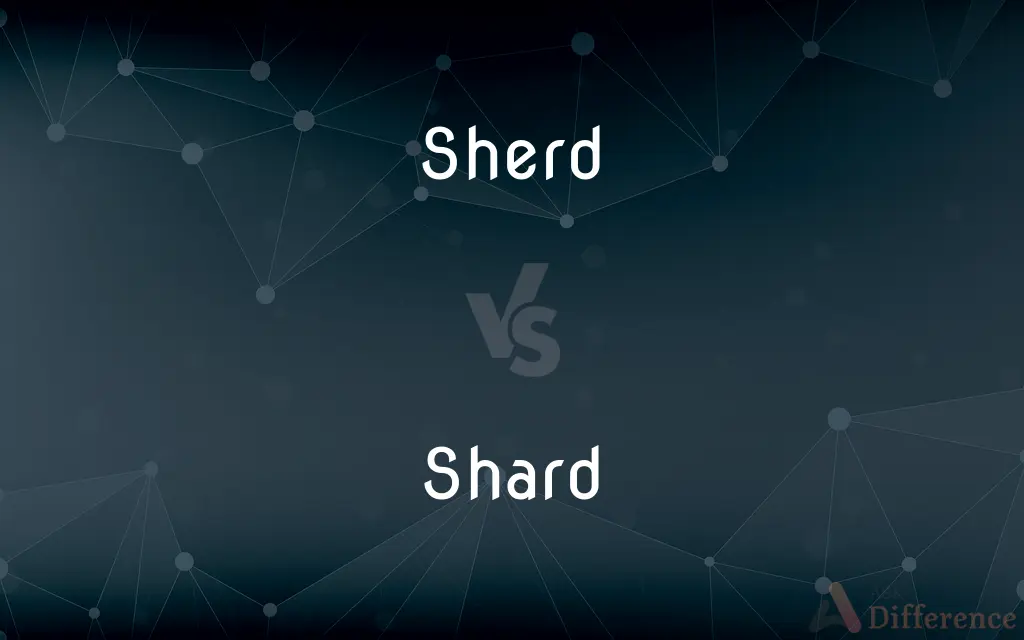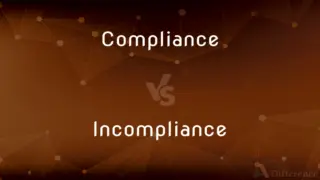Sherd vs. Shard — What's the Difference?
By Urooj Arif & Fiza Rafique — Updated on March 26, 2024
A sherd is a fragment of pottery, whereas a shard can be a piece of any broken material, like glass or metal.

Difference Between Sherd and Shard
Table of Contents
ADVERTISEMENT
Key Differences
Sherds, also known as potsherds, are specifically fragments of broken pottery, often found in archaeological contexts. These pieces can provide valuable information about past human activities, cultures, and technologies. Shard is a more general term that refers to a piece of broken ceramic, glass, metal, or any other hard material. While all sherds are shards, not all shards are sherds; the term shard can apply to a wider range of materials beyond pottery.
In archaeology, a sherd is crucial for understanding the pottery-making techniques, designs, and usage in ancient societies. It helps in dating archaeological sites and interpreting historical trade patterns. On the other hand, a shard of glass or metal might be studied for different reasons, such as understanding the manufacturing techniques of the time or the purposes those materials served in a specific historical or cultural context.
The distinction between a sherd and a shard also highlights the material's original use and the context of its discovery. A pottery sherd carries implications about domestic life, trade, and cultural practices. In contrast, a shard of glass might relate to architectural styles, technological advancements, or everyday items used by a society.
The term "sherd" implies a connection to human craftsmanship and history, especially in ceramics. A shard, given its broader definition, may not always have such a direct link to human activity; it could result from natural events breaking modern or ancient materials.
Both sherds and shards are integral to archaeological and historical studies, but their significance and the information they provide can differ markedly based on their composition, context, and the story they tell about past human life.
ADVERTISEMENT
Comparison Chart
Definition
Fragment of pottery.
Piece of broken material, such as glass or metal.
Specificity
Specific to pottery.
Applies to a broader range of materials.
Archaeological Significance
Offers insights into pottery-making, ancient cultures, and trade.
Can provide information on a variety of historical and cultural aspects.
Material
Ceramic materials only.
Can be ceramic, glass, metal, etc.
Context of Use
Primarily archaeological and historical.
Broader usage, including contemporary contexts.
Compare with Definitions
Sherd
A fragment of pottery that can help date an archaeological site or provide insight into historical lifestyles.
Each sherd collected was cataloged for further analysis.
Shard
Can refer to fragments resulting from the breakage of any hard substance.
The archaeologists discovered shards of a bronze mirror.
Sherd
An artifact that serves as a clue to the past, particularly in the study of ancient societies.
This sherd suggests the site was occupied by a civilization with advanced pottery skills.
Shard
Broad in its application, encompassing materials beyond ceramics.
The metal shard was identified as part of a historical weapon.
Sherd
A broken piece of ceramic material, especially one found at an archaeological site.
The excavation team found a sherd decorated with ancient symbols.
Shard
Implies a piece of something larger that has been broken.
She collected the colorful glass shards to use in a mosaic.
Sherd
Specifically refers to pottery, distinguishing it from fragments of other materials.
The museum's display included sherds from various periods.
Shard
Not limited to archaeological contexts; used in contemporary settings.
Shards from the broken sculpture were scattered across the floor.
Sherd
Often used in plural to discuss pottery fragments collectively.
The sherds were pieced together to reconstruct the original pot.
Shard
A piece of broken glass, metal, or other hard materials.
He carefully cleaned up the shards of glass from the broken window.
Sherd
Variant of shard.
Shard
A broken piece or fragment, as of pottery or glass.
Sherd
A fragment; - now used only in composition, as in potsherd. See Shard.
The thigh . . . which all in sherds it drove.
Shard
(Zoology) A tough scale or covering, such as the elytron of a beetle.
Sherd
A broken piece of a brittle artifact
Shard
A piece of broken glass or pottery, especially one found in an archaeological dig.
Shard
(by extension) A piece of material, especially rock and similar materials, reminding of a broken piece of glass or pottery.
Shard
A tough scale, sheath, or shell; especially an elytron of a beetle.
Shard
(online gaming) An instance of an MMORPG that is one of several independent and structurally identical virtual worlds, none of which has so many players as to exhaust a system's resources.
Shard
(databases) A component of a sharded distributed database.
Shard
A piece of crystal methamphetamine.
Shard
(intransitive) To fall apart into shards, usually as the result of impact or explosion.
Shard
(transitive) To break (something) into shards.
Shard
To divide (an MMORPG) into several shards, or to establish a shard of one.
Shard
A plant; chard.
Shard
A piece or fragment of an earthen vessel, or a like brittle substance, as the shell of an egg or snail.
The precious dishBroke into shards of beauty on the board.
Shard
The hard wing case of a beetle.
They are his shards, and he their beetle.
Shard
A gap in a fence.
Shard
A boundary; a division.
Shard
A broken piece of a brittle artifact
Common Curiosities
Can the term "shard" be used interchangeably with "sherd"?
While "shard" can technically encompass "sherd," using "sherd" specifies that the fragment is of pottery, so they are not always interchangeable.
How are sherds used to date archaeological sites?
Sherds can be dated based on their material composition, decorative styles, and manufacturing techniques, providing chronological information about the site.
What is the main difference between a sherd and a shard?
The main difference is specificity; a sherd specifically refers to a piece of broken pottery, while a shard can be a piece of any broken hard material.
Is a glass fragment considered a sherd or a shard?
A glass fragment is considered a shard, as "sherd" is reserved for pottery fragments.
Are there specific methods for analyzing sherds and shards?
Yes, there are specific methods, including chemical analysis, microscopy, and stylistic analysis, tailored to the material type and research questions.
Can contemporary broken pottery be considered a sherd?
In a general sense, yes, but in archaeology, "sherd" typically refers to historic or ancient pottery fragments.
Why are sherds important in archaeology?
Sherds help archaeologists understand ancient cultures, pottery-making techniques, trade, and the daily lives of past societies.
What can a shard tell us?
Depending on its material, a shard can provide information about manufacturing techniques, the use of objects in society, and historical events.
Can sherds and shards reveal information about the same society?
Yes, both sherds and shards can offer insights into the same society but from different perspectives, such as domestic life vs. technological advancements.
How do the materials of sherds and shards affect their preservation?
Preservation depends on the material's durability and the environmental conditions; ceramics tend to preserve well in a variety of conditions, while other materials like glass or metal may degrade or corrode.
Share Your Discovery

Previous Comparison
Compliance vs. Incompliance
Next Comparison
Raccoon vs. LemurAuthor Spotlight
Written by
Urooj ArifUrooj is a skilled content writer at Ask Difference, known for her exceptional ability to simplify complex topics into engaging and informative content. With a passion for research and a flair for clear, concise writing, she consistently delivers articles that resonate with our diverse audience.
Co-written by
Fiza RafiqueFiza Rafique is a skilled content writer at AskDifference.com, where she meticulously refines and enhances written pieces. Drawing from her vast editorial expertise, Fiza ensures clarity, accuracy, and precision in every article. Passionate about language, she continually seeks to elevate the quality of content for readers worldwide.















































